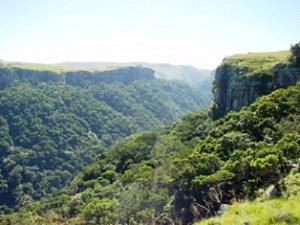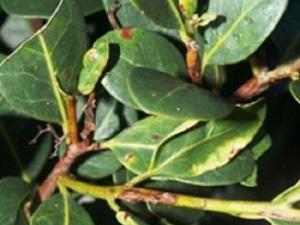Seonju Marincowitz
The aim of our project is to investigate fungal diseases in the Pondoland Centre, targeting on the species of three indigenous trees: Eugenia, Syzygium and Rhynchocalyx.

Mtamvuna Nature Reserve overlook view. © Dr. Marincowitz.
The Maputaland-Pondoland-Albany (MPA) is one of 34 biodiversity hotspots in the world and lies on the east coast of southern Africa.

Canker of Apodytes abbottii. © Dr. Gryzenhout
It is the second richest floristic region in Africa and is known to shelter about 600 tree species, which is the highest tree richness of any known temperate forests. The Pondoland Centre (PC) is part of the MPA and is home for roughly 1800 vascular plants with more than 120 endemic species. Nowadays, unexpected disease outbreak in native vegetation is worldwide trend, which is triggered by environmental stress, especially climate changes, increased human activities and frequent introduction of foreign pathogens. Disease monitoring is an active way of conserving plant communities and their habitats. The assessment of occurring diseases and its resultant list of pathogenic fungi is essential to advance this activity. Despite its worldwide acknowledged status, no investigation has been made on the disease occurrence in the Pondoland vegetation.
The output of our survey will serve as a stepping-stone to a comprehensive database of plant pathogenic fungi and fungal biodiversity on the indigenous flora in the PC. This will bring attention to the health status of native trees, and make it possible to monitor potentially devastating introduced or native pathogens.
Furthermore, the data on fungal diversity will add to those of flora and fauna in the region in any conservation issues. The live cultures generated from this project will secure to-be-extinct fungal communities in the case of habitat loss in future. Close interactions with local people, such as nature reserve wardens and enthusiastic amateur naturalists, will give us an opportunity to train them to be aware of disease occurrence and monitor it. The communication links built during our project between local people and specialists at FABI will play an active role in the management of nature conservation areas.
Two field trips are planned to the Umtamvuna Nature Reserve and the Oribi Gorge Nature Reserve that are the major conservation areas of the PC. The leaves, twigs or trunks of Eugenia, Syzygium and Rhynchocalyx species showing any disease symptoms will be collected.
Their symptoms and severity will be photographed and recorded. The causative fungi will be isolated and identified using morphological characteristics and DNA sequence data. The resultant data, information and images, will be compiled, digitalized and provided as references for conservation management of the vegetation in the PC.